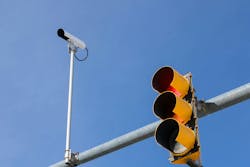Pittsburgh Approves Automated Red Light Enforcement Camera System
Pittsburgh City Council approved the installation of six automated red light enforcement cameras throughout town, with operations set to begin this winter.
"This will absolutely help people understand they need to stop at red lights, obey the law, and hopefully slow down," said Councilmember Erika Strassburger, who proposed the tech adoption.
From 2019 to 2023, Pittsburgh had 759 red light crashes. Seven resulted in fatalities.
The automated system captures a photo of vehicles that run a red light and sends it to law enforcement. Signage will be placed at the intersection to notify drivers of the cameras.
The cameras will start with a 30-day warning period. Anyone caught violating traffic laws during this time receives a warning, not a ticket.
A human will review each incident before tickets are approved. Once the violation is issued, Pennsylvania law sets the fine at $100. Offenders have 30 days to pay the fine or appeal the violation.
Before the city council’s vote, Pittsburgh Department of Mobility and Infrastructure officials said they wanted to install cameras at the following intersections:
- North Dallas and Penn avenues
- General Robinson and Anderson streets
- Negley and Fifth avenues
- West End Bridge and Route 65
- Saw Mill Run Boulevard and Woodruff Street
- Browns Hill Road and Parkview Boulevard
The Pennsylvania Department of Transportation must approve the automated red light camera locations before installation. Final selection will consider red light crash percentages, vulnerable road usage populations, visibility of the signal systems and more.
Six more intersections will receive an automated enforcement system each year through a five-year contract with Verra Mobility, up to 30 red light cameras in Pittsburgh by the end of 2029. The program costs about $14 million.
“We expect to recoup 100% of the costs,” Strassburger said. “Anything that we recoup beyond the cost of the program — so the cost of the cameras at each of the intersections, four cameras per intersection — will be sent to the state, to PennDOT, for a special fund to be granted out for infrastructure improvements throughout the state, including Pittsburgh.”
Sources: TribLIVE, WTAE, CBS News, City of Pittsburgh
